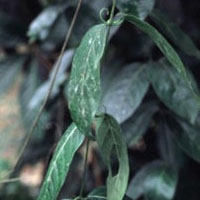health guides
Cat′s Claw
 © Steven Foster
© Steven FosterParts Used & Where Grown
Cat’s claw grows in the rain forests of the Andes Mountains in South America, particularly in Peru. The two species of the plant used most commonly are U. tomentosa, which makes up most of the cat’s claw imported to the U.S., and U. guianensis, which is more widely used in Europe. In South America, both species are used interchangeably. The root bark is used as medicine.
- Reliable and relatively consistent scientific data showing a substantial health benefit.
- Contradictory, insufficient, or preliminary studies suggesting a health benefit or minimal health benefit.
- For an herb, supported by traditional use but minimal or no scientific evidence. For a supplement, little scientific support.
Our proprietary “Star-Rating” system was developed to help you easily understand the amount of scientific support behind each supplement in relation to a specific health condition. While there is no way to predict whether a vitamin, mineral, or herb will successfully treat or prevent associated health conditions, our unique ratings tell you how well these supplements are understood by the medical community, and whether studies have found them to be effective for other people.
For over a decade, our team has combed through thousands of research articles published in reputable journals. To help you make educated decisions, and to better understand controversial or confusing supplements, our medical experts have digested the science into these three easy-to-follow ratings. We hope this provides you with a helpful resource to make informed decisions towards your health and well-being.
This supplement has been used in connection with the following health conditions:
| Used for | Amount | Why |
|---|---|---|
Osteoarthritis | 100 mg of a freeze-dried preparation daily | Cat’s claw has been used traditionally for osteoarthritis. In one trial, cat's claw was significantly more effective than a placebo at relieving pain and improving overall condition. |
Rheumatoid Arthritis | Refer to label instructions | Cat’s claw has been used traditionally to treat rheumatoid arthritis. |
HIV and AIDS Support | Refer to label instructions | Cat’s claw is an immuno-modulating herb. Standardised extracts of it have been shown to help prevent CD4 cell counts from dropping and to prevent opportunistic infections. |
Immune Function | Refer to label instructions | Substances found in cat’s claw, called oxyindole alkaloids, have been shown to stimulate the immune system. |
Traditional Use (May Not Be Supported by Scientific Studies)
Cat’s claw has been reportedly used by indigenous peoples in the Andes to treat inflammation, rheumatism, gastric ulcers, tumours, dysentery, and as birth control.1 Cat’s claw is popular in South American folk medicine for treating intestinal complaints, gastric ulcers, arthritis, and to promote wound healing.
Copyright © 2024 TraceGains, Inc. All rights reserved.
Learn more about TraceGains, the company.
The information presented by TraceGains is for informational purposes only. It is based on scientific studies (human, animal, or in vitro), clinical experience, or traditional usage as cited in each article. The results reported may not necessarily occur in all individuals. Self-treatment is not recommended for life-threatening conditions that require medical treatment under a doctor's care. For many of the conditions discussed, treatment with prescription or over the counter medication is also available. Consult your doctor, practitioner, and/or pharmacist for any health problem and before using any supplements or before making any changes in prescribed medications. Information expires December 2024.


 We are proud to announce that
We are proud to announce that  As the market evolves, customers increasingly request a wider variety of omega-3 options for their lipid...
As the market evolves, customers increasingly request a wider variety of omega-3 options for their lipid...  Maintaining healthy glucose levels is crucial for preventing metabolic conditions like diabetes,...
Maintaining healthy glucose levels is crucial for preventing metabolic conditions like diabetes,...  Looking at formulating a new vitamin blend? Discover
Looking at formulating a new vitamin blend? Discover 







































